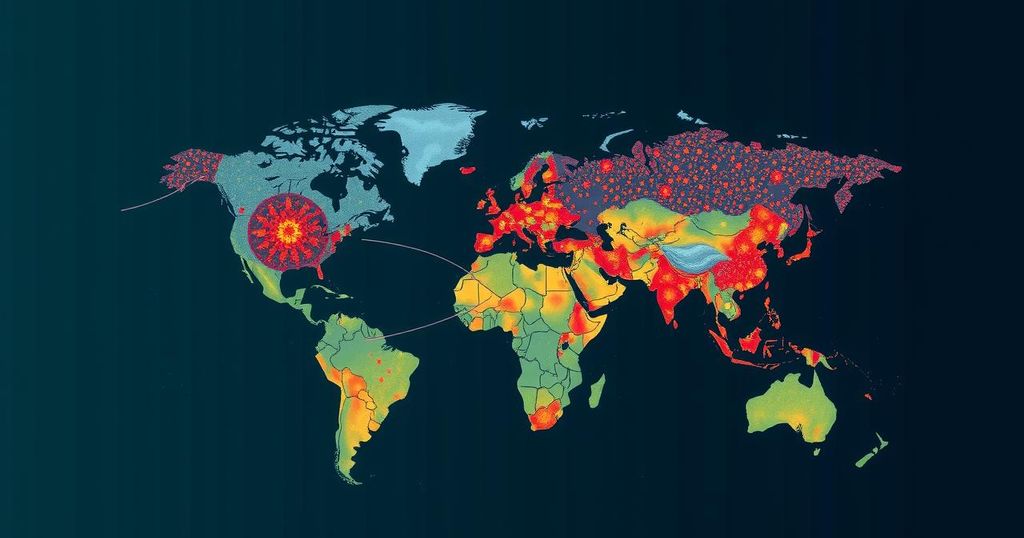A recent report warns that climate change poses unprecedented health threats, with ten out of fifteen tracked indicators hitting alarming new records. Key findings include a 167% increase in heat-related deaths among the elderly and more than five million dengue cases globally. The urgency for action is emphasized as fossil fuel consumption rises alongside significant environmental degradation, yet some progress in clean energy adoption is noted. Immediate action is required to prevent further health crisis resulting from climate change.
A recent report underscores the escalating risks that climate change poses to global health, revealing unprecedented threats that demand immediate action. Amid extreme weather events such as heatwaves, hurricanes, and droughts, 2023 is projected to become the warmest year on record. The report was published ahead of the upcoming United Nations COP29 talks in Azerbaijan and shortly before a critical U.S. presidential election that may influence climate policy significantly. The Lancet Countdown on Health and Climate Change, with insights from 122 experts, highlights that out of 15 tracked health indicators, ten have reached alarming new heights. This includes alarming rises in deaths among the elderly due to heat stress, the spread of infectious diseases linked to changing climates, and increasing food insecurity as agriculture is devastated by natural disasters. Marina Romanello, the executive director of the Lancet Countdown, warned that the data reflects record health threats that scientists have not witnessed before. For instance, the mortality rate for individuals over 65 from heat has surged by 167% since the 1990s. Additionally, the report highlights that last year saw over five million cases of dengue fever globally, signaling a worrying increase in vector-borne diseases as mosquito populations expand. The findings also indicate significant environmental degradation, with approximately 5% of the world’s tree cover lost from 2016 to 2022, which diminishes the planet’s ability to absorb excess carbon dioxide. The report emphasized that while corporations in the fossil fuel sector continue to expand their operations, the rates of greenhouse gas emissions have surged, with fossil fuel subsidies ballooning to $1.4 trillion in 2022, overshadowing efforts towards sustainable transition. Yet, the report does present a glimmer of hope, noting that between 2016 and 2021, deaths caused by fossil fuel-related air pollution decreased by nearly 7%, mainly due to actions reducing coal pollution. The utilization of clean renewable energy sources nearly doubled to 10.5% during the same period, reflecting a positive shift. The urgency for action cannot be overstated, as Romanello concluded, stating, “There is really no more time to waste… what we are seeing is that the wasted time has been paid in lives.” Individuals are encouraged to adopt climate-friendly practices, choose sustainable diets, minimize carbon emissions from travel, disengage from banks that fund fossil fuels, and support politicians committed to combating climate change.
The report by the Lancet Countdown on Health and Climate Change is an essential resource that tracks the intersection of climate change and public health. It is particularly crucial as nations grapple with the repercussions of climate change, including extreme weather phenomena and their direct effects on human health. By evaluating various health indicators over time, the report aims to provide a comprehensive understanding of how climate-related issues exacerbate health threats across the globe. This context is vital as international discussions, such as those at the upcoming COP29, are poised to address the necessity of integrating health considerations into climate policy.
The findings of this report serve as a stark reminder of the intertwined nature of climate change and health threats, underscoring the critical need for immediate and sustained action. With many indicators reaching alarming records, it is imperative to prioritize health-centric climate policies and individual actions to mitigate these risks. While some progress has been made in transitioning to cleaner energy sources and reducing pollution-related deaths, much work remains to secure a healthier future devoid of the current climate emergencies that endanger lives.
Original Source: jen.jiji.com







